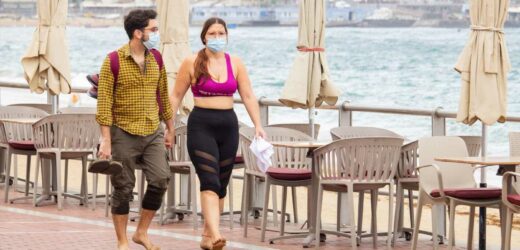BRITS opting for a holiday abroad this year will have to think carefully where they go due to Covid.
While there are just 12 countries on the UK's green list which allows restriction-free travel right now, families planning ahead may have to opt for a different destination this year.
Portugal is one of the few holiday destinations on the green list which won't require a quarantine when returning to the UK, which saw thousands of Brits flock to the country last week.
Despite being on the amber list, which requires a 10-day UK quarantine, thousands have also headed to Spain this week after the country lifted all travel restrictions for UK arrivals.
Families wanting to pick a safer holiday option this year, should consider four major factors relating to how likely their trip will go ahead and how low the risk of Covid is in the country.
Here is what to consider when booking a holiday this year post-lockdown.
1. Covid surges and new variants
Brits may find countries closing at short notice due to new variants, if they post a risk to the UK's vaccine rollout by being less affected by the jabs.
In December, many European destinations closed their doors to the UK due to the Kent variant – something which Germany and Austria have since reinstated due to the Indian variant.
New variants also led to the addition of Portugal to the UK's red list due to the fears of the Brazil variant, despite the countries own low case rate, as it as a transport link between the two countries.
It is also why the UAE remains on the UK's red list, due to being a transport hub.
Not only that, but Covid surges have also seen most of Europe kept off the UK's green list.
Greece reported their highest daily case rates of Covid last month, while France reported daily case rates as high as 65,000.
While Europe is slowly coming out of their most recent Covid surges, the slow return to tourism means most countries remain off the cards for Brits.
2. Slow vaccine rollouts
The UK is one of the leading countries for the vaccine – 56 per cent has been given the first dose, and is only beaten by countries such as Israel who is at 62 per cent.
While countries such as the US are close behind, at 49 per cent, most of Europe saw a much slower rollout of the vaccine which means travel has not been able to open at the same speed as the UK.
Spain, Italy, Portugal have increased their vaccination rate in recent weeks, all at 35 per cent, while France (34 per cent) and Greece (31 per cent) are close behind.
Turkey is unlikely to be on the UK's green list for a while, with just 19 per cent of the population given the first dose.
It could also lead to infection rates increasing with a mixture of vaccinated tourists in primarily non-vaccinated countries.
Mami Taniuchi, an infectious disease researcher at the University of Virginia, warned: "In a situation where there's a mixing of people who are vaccinated and unvaccinated, most of the transmission events are going to be among those who are not vaccinated."
3. Local lockdown restrictions
Brits wanting to head to the same destination for their holiday, may not find the same experience due to local restrictions.
Countries such as Spain and Greece have been welcoming tourists, but still have some lockdown rules in place such as capacity limits, closed nightclubs and night-time curfews.
In France, bars and museums have only just reopened although a curfew is in place from 9pm, while Spain is only allowing four people per table when dining in public with curfews also in place across the islands.
Beaches in Portugal and Spain are enforcing face masks when moving in busy crowds.
Thankfully many destinations are lifting local lockdown rules, although Brits will likely have to check before travelling whether they will have to change their usual holiday habits.
4. Vaccine passports
Vaccine passports are being considered by many countries to allow fully jabbed tourists to travel without restrictions, including the UK.
Fully vaccinated Brits are set to be welcomed into the EU with no need for a test or quarantine as "Covid passports" get the green light this week.
However, this has led to concerns of unfairness for those who are not offered the jab – WHO have warned against using proof of vaccination for travelling, as it is "not available on an equitable basis".
Not only that, but without official documentation which is yet to be pushed through, it has led to fears of fake vaccine documents with the NHS records being easily replicated.
Greece is currently allowing Brits to use their NHS cards proving they have had both jabs, although reports have found fake cards being sold online.
Countries including Portugal and Spain have welcomed Brits back, but the UK government has warned the amber and green list can change at short notice.
Here is everything you need to know about how much your Covid tests will cost to go on holiday this year.
Don't fancy going abroad this year? Here are the best seaside pubs in England to visit this summer.
Source: Read Full Article









